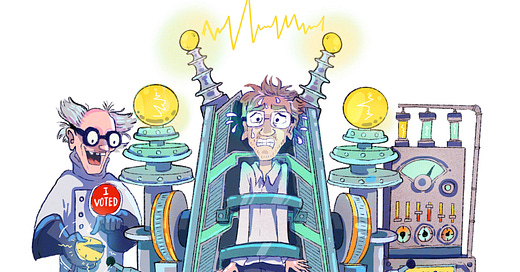My Simplistic Theory of Left and Right: The Talk
The first lecture and Q&A on my controversial general theory of ideology
[Reminder: I’m running my first Ask Me Anything for paid subscribers tomorrow at 4 PM ET. With all new AV equipment. Upgrade if you want to participate.]
Back in 2015, I found myself deeply dissatisfied with all of the other theories of left and right. Survive/thrive theory is especially overrated. So I modestly proposed my own: the Simplistic Theory of Left and Right. When I look at the top-two rival global ideologies, I, like the Lewis brothers, mostly see an incoherent mess driven by tribalism. Unlike the Lewis brothers, however, I also see two durable if insipid intellectual cores:
The left is anti-market.
The right is anti-left.
I’ve been pushing my Simplistic Theory for almost a decade. Multiple supportive essays get considerable space in my recent Voters As Mad Scientists. Yet only recently did I publicly present by first talk on the subject to the Sarasota Economics Club. Here’s the video of the full talk, followed by Q&A. Moderated by the Reason Foundation’s Adrian Moore.
Enjoy!
Subscribe to Bet On It
Caplan and Candor







There is one thing Bryan needs to provide evidence for: that being on the left is a result of being anti-market rather than a cause of it. The Lewis brothers' theory would suggest that people first become liberals/progressives for social reasons then adopt anti-market views once they join the tribe. I would like to see Bryan write a post where he refutes this notion and explains his own position of anti-market views being downstream from philosophical leftism which is independent of any social factors.
Thomas Sowell didn't say that the constrained and unconstrained visions are the visions of the political right and left, respectively, he said that they were opposite ends of a continuum and that various traditions of political thought fall somewhere on that continuum. He also said that political ideologies need not be static, for example he said with Marxism the idea is to start out more constrained but slowly shift toward less constraint.
Any position on a topic can seem ridiculous if you misunderstand it hard enough. If your interpretation of Sowell's idea is so far off the mark from what one would get by actually reading "A Conflict of Visions" then I'm not sure why one should believe that you're being any more accurate in your claims about other theories.